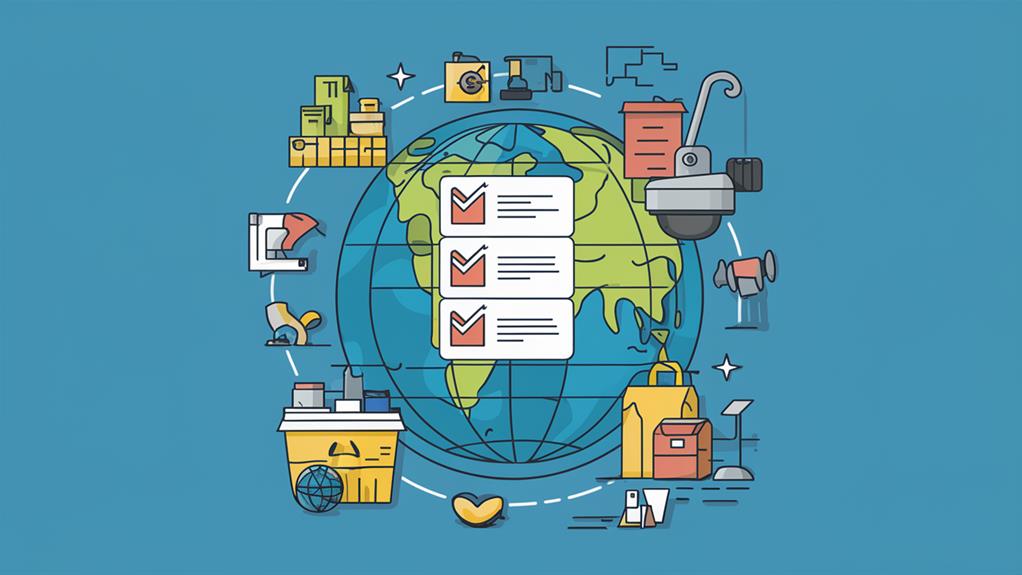To plan your international move in stages, start at least six months ahead. First, create a timeline to track key dates for visas and housing. Gather essential documents like passports and medical records early, ensuring they're valid for at least six months beyond your travel date. Research housing options and understand local customs for a smoother transition. Budget carefully, saving for moving costs and healthcare. Finally, learn about cultural differences and consider joining expatriate groups for support. By following these guidelines, you can make your moving experience easier and more organized, and there's more to discover on this journey.
Pre-Move Planning Timeline
To ensure a successful international move, start your pre-move planning at least six months in advance. This gives you ample time to handle the logistics and necessary paperwork, making your transition smoother.
Begin by creating a comprehensive moving timeline that outlines key dates, such as visa applications, housing arrangements, and shipping schedules. Keeping everything organized is crucial. Additionally, consult country-specific requirements to avoid any potential hurdles during your move.
As you approach the one-month mark before your move, finalize all necessary paperwork, including permits and vaccination certificates. Start packing non-essential items to lighten your load.
In the last week before moving, confirm your travel arrangements and prepare a list of essential items you'll need for your journey. Make sure you have all critical documents easily accessible, as they'll be vital during your travels.
Throughout this process, utilize a detailed checklist to track completed tasks. This helps you avoid overlooking important aspects of your international move.
Essential Documentation
As you finalize your pre-move preparations, gathering the right documents is key to a smooth relocation. Start by collecting essential documents like passports, birth certificates, marriage certificates, and medical records well in advance.
Make sure your passport is valid for at least six months beyond your planned travel date, as many countries require this for entry. Additionally, familiarize yourself with customs regulations in your destination country, as this can affect what you can bring and the documentation required.
Next, apply for necessary visas early, since approval timelines can vary significantly depending on your destination and the type of visa you need. It's wise to check the specific requirements for the country you're moving to.
Additionally, prepare any required translations of important documents, as some countries may need official translations for legal or immigration purposes.
To keep everything organized, store both physical and digital copies of all important documents in a secure location. This will help prevent loss during the relocation process.
Housing and Logistics
Navigating the housing market in your new country can be daunting, but thorough research helps simplify the process. Start by exploring local real estate markets and understanding the legal requirements to uncover the housing options available to you.
Familiarize yourself with long-distance moving costs to better budget for your international transition. Utilize online platforms like I-Housing.com and connect with real estate agents who specialize in helping international clients find suitable homes that fit your needs.
As you plan your move, consider the logistics of shipping your belongings. Familiarize yourself with customs regulations and the various shipping methods available, which will help ensure a smooth transport process.
Don't forget to factor in additional costs, including deposits, utility setups, and maintenance fees, which can add up significantly during your transition.
If your long-term housing isn't ready when you arrive, think about temporary accommodations. This allows you the flexibility to secure a permanent place while managing the arrival of your belongings.
Financial and Healthcare Preparation
After sorting out housing and logistics, it's time to tackle financial and healthcare preparation for your international move.
Start saving at least six months in advance, as moving costs can be ten times higher than local relocations. Aim for a budget that includes housing deposits, transportation, and insurance costs. Research the cost of living in your new country using resources like Numbeo and Expatistan, so you can establish a detailed monthly budget covering both fixed and variable expenses.
Consulting an accountant is crucial to understand your tax obligations in both your home and destination countries, as expatriates often face different tax liabilities. Keep all financial documents organized, including bank statements and tax records. Maintain your current bank account to ensure continuity of your credit score, and inform your financial institutions about your move.
Next, investigate healthcare options in your new location. Understand the local healthcare system and check if your current health insurance provides coverage abroad.
If it doesn't, consider obtaining international health insurance for comprehensive protection. This way, you'll be prepared for any unexpected healthcare needs while living overseas.
Cultural and Language Considerations
Cultural and language considerations play a crucial role in ensuring a smooth transition during your international move. Understanding cultural differences and local customs can significantly ease your adjustment. About 70% of expatriates experience culture shock in their first year abroad, making it essential to prepare.
Engaging in language learning through apps or local classes will enhance your communication skills, helping you navigate daily interactions and reducing feelings of isolation.
It's also vital to research social etiquette and norms. Missteps, like misunderstanding eye contact, can lead to unintentional disrespect.
Joining expatriate groups can provide community support; around 50% of expatriates find guidance and friendship through these networks, aiding in cultural acclimatization.
Familiarizing yourself with the local language not only improves integration but is also linked to increased job opportunities. Studies show that 80% of expatriates who learn the local language report a more positive living experience.
Conclusion
Planning your international move doesn't have to feel overwhelming. By breaking it down into stages, you can manage each step effectively. Remember to gather essential documents, find suitable housing, and prepare financially and health-wise. Also, consider cultural differences and language barriers to ease your transition. By staying organized and informed, you'll make your move smoother and more enjoyable. Embrace the adventure ahead, and you'll be ready to start this exciting new chapter in your life!
